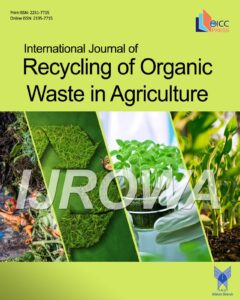Valorization of vermicompost with bacterial fermented chicken feather hydrolysate for the yield improvement of tomato plant: A novel organic combination
Authors
-
Ishita Biswas
 1
1
- Debasis Mitra 1
- Ansuman Senapati 2
- Debanjan Mitra 1
- Sourav Chattaraj 1
- Murshed Ali 3
- Goutam Basak 1, 4
- 5, 6, 7, 8
- 5, 6, 7, 8
Abstract
Purpose Chicken feather protein hydrolysate (CFPH) has drawn a significant attention as a component/type of biofertilizer in recent years, because of the beneficial impact on the growth of the plant. The current study aims to evaluate the potential influence of the combination of CFPH with vermicompost (VC) on growth-promotion and yield improvement in tomato plants.
Method Feather degrading bacteria were isolated and characterized using 16s-rDNA sequencing, and assessed for biochemical reactions, growth-promoting attributes and keratinase activity. The medium used for feather degradation studies consisted of 0.75% (w/v) of raw feather, with 1% (v/v) of inoculum at 37°C, pH 7.5 and at 120 rpm. A field study was done by randomized block design (RBD) with five treatments in tomato.
Results Keratinolytic and feather degrading bacteria isolated and used in this study were identified as Bacillus cereus PKID1 with accession number MT158702. The bacterium gave the highest keratinase activity of 80±0.28 U/ml. The CFPH showed the potential to promote remarkably the germination % of tomato (84.13), rice (87.24), onion (84.13), chilli (84.13), chickpea (73.24) seeds ; field experiment significantly increased plant growth and yield compared with control.
Conclusion The principal component analysis of the field experiment as a result of tomato plant-growth, the order of best treatment efficacy for improvement of parameter estimates was as follows: CFPH and VC > CFPH > VC > recommended dose of fertilizers (RDF) > control. Thus, the application of CFPH with VC could improve the productivity of crops and decrease the use of chemical fertilizers.



